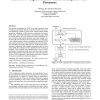Free Online Productivity Tools
i2Speak
i2Symbol
i2OCR
iTex2Img
iWeb2Print
iWeb2Shot
i2Type
iPdf2Split
iPdf2Merge
i2Bopomofo
i2Arabic
i2Style
i2Image
i2PDF
iLatex2Rtf
Sci2ools
122
click to vote
LCTRTS
2007
Springer
2007
Springer
Tetris: a new register pressure control technique for VLIW processors
The run-time performance of VLIW (very long instruction word) microprocessors depends heavily on the effectiveness of its associated optimizing compiler. Typical VLIW compiler phases include instruction scheduling, which maximizes instruction level parallelism (ILP), and register allocation, which minimizes data spills to external memory. If ILP is maximized without considering register constraints, high register pressure may result, leading to increased spill code and reduced run-time performance. In this paper, a new register pressure reduction technique for embedded VLIW processors is presented to control register pressure prior to instruction scheduling and register allocation. By modifying the relative ordering of operations, this technique restructures code to better reduce spills. Our technique has been implemented in Trimaran, an academic VLIW compiler, and evaluated using a series of VLIW benchmarks. Experimental results show that, on average, our algorithm reduces dynamic sp...
| Added | 08 Jun 2010 |
| Updated | 08 Jun 2010 |
| Type | Conference |
| Year | 2007 |
| Where | LCTRTS |
| Authors | Weifeng Xu, Russell Tessier |
Comments (0)

